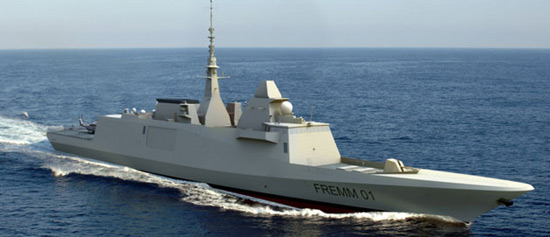FREMM frigate-class
Summary
| Origin country | 🇫🇷 France |
| Category | Frigate |
| Subtype | Multi-purpose frigate |
| Manufacturer | Naval Group |
| Year commissioned | 2012 |
| Approx. unit cost | $795 million |
| Units |
D650 Aquitaine D651 Normandie D652 Provence D653 Languedoc D654 Auvergne D655 Bretagne D656 Alsace D657 Lorraine F 590 Carlo Bergamini F 591 Virginio Fasan F 592 Carlo Margottini F 593 Carabiniere F 594 Alpino F 595 Luigi Rizzo F 596 Federico Martinengo F 597 Antonio Marceglia F 598 Spartaco Schergat |
Description
The FREMM (Frégate Européenne Multi-Mission) is a Franco-Italian class of multi-purpose frigates developed by Naval Group and Fincantieri. The program was established to replace the Georges Leygues and Cassard classes in France and the Lupo and Maestrale classes in Italy.
The class is divided into the French Aquitaine and Italian Bergamini variants. These ships are configured for anti-submarine warfare, general-purpose, and anti-air warfare roles. Propulsion systems differ by navy, with French units using a CODLOG arrangement and Italian units using CODLAG. Sensors include electronically scanned array radars and both hull-mounted and towed sonar suites. Armament across the class utilizes vertical launch systems for Aster missiles, complemented by anti-ship missiles and torpedo launchers. Specific equipment varies by national requirement, such as the inclusion of land-attack cruise missiles on French vessels and different naval gun configurations on Italian ships.
The French Navy commissioned the lead ship in 2012, followed by the first Italian vessel in 2013. Export customers include Morocco, which received a frigate in 2014, and Egypt, which operates three units, including ships originally ordered by the French and Italian navies. In 2024, Italy ordered the FREMM-EVO variant to update its fleet with dual-band radar and enhanced missile capabilities. The United States Navy selected a FREMM derivative for the Constellation class, though the program was cancelled in November 2025. Greece entered an agreement in 2025 to acquire two Italian vessels with an option for two additional hulls. Indonesia and Portugal have also pursued acquisitions or options for the design. As of 2024, the class remains in production in both France and Italy.
Technical specifications
| Displacement | 6700 tons |
| Range | 6800 km at 15 knots |
| Crew | 145 members |
| Width | 20.0 m (65.6 ft) |
| Length | 144.6 m (474.4 ft) |
| Air Park | |
| Propulsion | CODLOG (France) or CODLAG (Italy): 1 × 32 MW General Electric/Avio LM2500+G4 gas turbine, 2 × 2.5 MW electric motors, 4 × diesel generators |
| Armament |
|
| Maximum speed | 27 knots |
Further Reading
As an Amazon Associate, we may earn from qualifying purchases.
